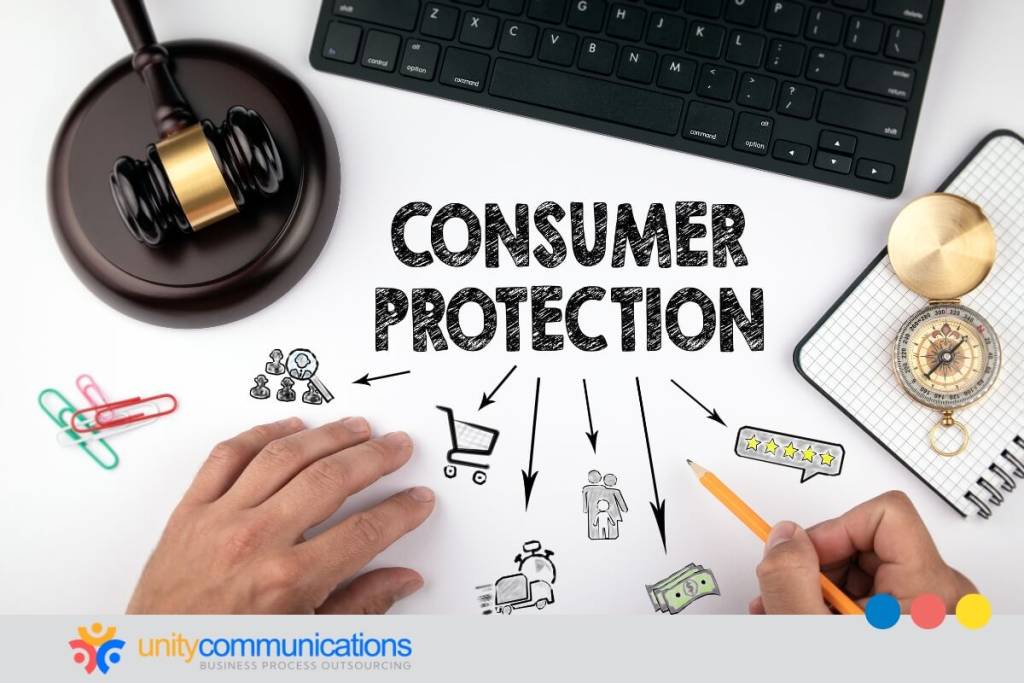IN THIS ARTICLE
Table of Contents
BPO agencies and third-party providers must adhere to the rigorous regulations and consumer protection laws that oversee their activities. Violation can lead to substantial fines, legal consequences, and reputational damage. Thus, ensuring compliance is essential for the longevity and success of their business.
Adopting solutions tailored to their specific requirements and navigating the dynamic landscape of evolving regulations and compliance standards are significant challenges in business process outsourcing.
This article explores the consumer protection laws affecting BPO companies and their strategies for compliance.
Consumer Protection Laws That May Affect BPO Companies

Consumer protection laws safeguard buyers from deceitful business practices, substandard products, and unsafe goods and services. These laws play a vital role in fostering a trustworthy market economy by ensuring sellers operate honestly, preventing unwanted surprises for consumers.
In the United States, consumer protection is governed by a combination of federal and state agencies, each addressing specific sectors of the economy. The Federal Trade Commission (FTC) oversees national consumer protection, while individual states utilize diverse agencies and statutes to enforce and, in some cases, expand upon laws.
Consumer protection measures can vary among jurisdictions, with some demonstrating a more pro-consumer stance than others. At the state level, various statutes protect consumers against deceit and fraud perpetrated by the private sector and individuals selling goods or services.
An example is California’s Consumers Legal Remedies Act, which is considered one of the most comprehensive consumer protection statutes nationwide. This act prohibits different forms of false advertising, including misrepresenting goods’ source or quality and falsely labeling used or deteriorated items as “new.” Individuals harmed by unjust actions may seek:
- Compensation for actual damages
- A court order to stop such practices
- The return of unlawfully acquired property
- Punitive damages
- Any other remedy deemed appropriate by the court
Consumer protection laws vary by country and region, so knowing the specific regulations covering your day-to-day operation is essential. BPO and customer service providers usually follow these types of consumer protection laws:
- Fair trading laws. BPO firms are prohibited from engaging in deceptive or unfair business dealings with consumers, including false advertising or misrepresenting products or services.
- Right to information. Consumers have the right to clear and accurate information about products and services, including pricing, terms, and conditions.
- Right to privacy. Laws may regulate how outsourcing vendors handle customer data and require consent for data collection and usage.
- Product liability laws. Consumers are protected against defective or unsafe products. Businesses may be liable for injuries or damages caused by their products.
- Contract laws and fair contract terms. Consumer contracts must be fair and transparent and not contain unfair terms. Unilateral changes to contract terms may be restricted.
- Consumer warranties and guarantees. Consumers may have certain guarantees regarding the quality, fitness for purpose, and durability of goods and services.
- Right of withdrawal (cooling-off period). In some jurisdictions, consumers may have a right to cancel certain contracts within a specified period without giving a reason.
- Alternative dispute resolution (ADR). Some jurisdictions require BPO companies to provide consumers access to ADR mechanisms, such as mediation or arbitration.
- Consumer complaint handling. BPO organizations may be required to handle consumer complaints promptly and effectively.
- Anti-discrimination law. BPO agencies may be prohibited from discriminating against consumers based on race, gender, age, or disability.
- Online consumer protection. Specific rules may apply to online transactions, including requirements for information disclosure, electronic contracts, and online dispute resolution.
- Financial consumer protection. Financial outsourcing services often have their own set of regulations to protect consumers, covering transparency, disclosure, and fair lending practices.
Importance of Understanding Consumer Protection Laws in BPO
BPO and customer service providers must stay informed about the specific consumer protection laws in their jurisdictions and ensure the compliance of their outsourcing practices. Violating consumer protection laws can result in legal consequences, financial penalties, and reputational harm.
One example is the Wells Fargo scandal in the United States. While Wells Fargo is primarily a financial institution, it also has BPO elements in its operations. In 2016, Wells Fargo faced allegations of unauthorized account openings and deceptive practices. The bank had to pay fines and settlements to resolve issues related to consumer protection.
BPO and customer service providers should have a comprehensive understanding of consumer protection laws for several important reasons:
- Avoid penalties and legal action. Failure to adhere to consumer protection laws can lead to severe penalties, fines, and legal actions. For instance, federal agencies can detain and seize defective products for which they have regulatory authority. Understanding these laws helps BPO companies mitigate legal risks.
- Build trust. Demonstrating a commitment to consumer protection enhances the reputation of BPO companies. Customers are more likely to trust and engage with businesses that prioritize ethical and legal practices.
- Guarantee quality service. Understanding consumer protection laws allows BPO companies to provide better, more transparent services. This, in turn, contributes to overall customer satisfaction and loyalty.
- Identify and address risks. Knowledge of consumer protection laws enables BPO companies to identify potential risks and address them proactively. They can ensure customer interactions, data handling, and dispute resolution processes align with legal requirements.
- Navigate international regulations. BPO companies often operate globally, serving clients in various jurisdictions. Understanding consumer protection laws in different regions is crucial to navigating their complexities.
- Negotiate and fulfill contracts. BPO companies frequently enter into agreements with clients that may include requirements related to consumer protection. Understanding these laws helps in negotiating and fulfilling contractual obligations.
- Secure customer data: Many consumer protection laws include data protection and privacy provisions. BPO companies handling customer data must comply with these regulations to safeguard sensitive information.
- Stay current with evolving laws. Consumer protection laws are subject to change. BPO companies must stay informed about updates and amendments to ensure ongoing compliance with evolving legal standards.
- Enhance customer relations. Knowledge of consumer protection laws allows BPO companies to communicate effectively with customers regarding their rights. This transparency enhances consumer trust and confidence in the services provided.
- Differentiate the brand in the market. Compliance with consumer protection laws can serve as a competitive advantage in the long term. BPO companies prioritizing legal adherence can differentiate themselves as responsible and trustworthy partners.
The Costs and Benefits of Complying With Consumer Protection Laws in BPO

Despite the rising expenses associated with compliance standards, research indicates that failing to meet these standards is 2.7 times more expensive. On average, the cost of compliance is around $5.5 million, while the cost of noncompliance is approximately $15 million.
How can you express the return on investment (ROI) of compliance and, more broadly, ethical company cultures? This question poses a challenge because the costs are concentrated while the benefits are dispersed. Demonstrating the advantages of a robust compliance program requires strategically quantifying its benefits.
Calculating the potential costs of a violation is possible. This analysis involves examining the penalties incurred by peer companies, such as:
- Adjustments to income
- Fees for legal and audit firms
- Expenses related to the audit committee
- Payments made in shareholder litigation
These are the potential costs facing a BPO company if it neglects and violates consumer protection laws.
Next, evaluate your compliance costs per dollar of revenue. Then, consider the potential costs of penalties per dollar of revenue.
This analysis, which is more precise and data-driven, can assist in estimating the expenses and benefits associated with compliance. It also sheds light on reducing costs by consolidating controls and adjusting policies.
How BPO and Service Providers Adhere to Consumer Protection Laws
So, what are BPO’s best compliance practices? BPO and customer service providers can implement the following strategies to ensure adherence to consumer protection laws:
- Conduct regular audits. Periodically assess internal processes, contracts, and policies to ensure alignment with current consumer protection laws. Regular audits help identify areas that may need improvements.
- Monitor legal updates. Consumer protection laws can change, and new regulations may be introduced. BPO companies should stay informed about relevant legal developments in their jurisdictions.
- Conduct training programs. Implement comprehensive training programs to educate workers on consumer protection laws, ethical business practices, and the importance of compliance. Ensure they are aware of their responsibilities.
- Establish a compliance team. Create a dedicated team responsible for monitoring and ensuring legal compliance. This team can stay updated on legal changes, guide other departments, and address compliance concerns.
- Define clear policies. Document and communicate clear policies and procedures regarding consumer protection compliance. Ensure that workers have easy access to this information.
- Encourage transparent communication. Communicate terms, conditions, and policies to customers. Transparency in communication builds trust and helps meet the requirements of consumer protection laws.
- Implement data security protocols. Develop and implement robust data protection measures to safeguard customer information. Ensure compliance with data protection and privacy laws, depending on the nature of the services provided.
- Review client contracts. Ensure that client contracts include provisions for compliance with consumer protection laws. Clearly define roles and responsibilities regarding legal adherence.
- Establish complaint-handling procedures. Implement adequate procedures for handling customer complaints. Ensure a systematic and transparent process for resolving issues with legal requirements.
- Benchmark against industry standards. Stay informed about industry best practices and standards related to consumer protection. Benchmarking against these standards can help identify areas for adjustment.
The Bottom Line

Compliance is a serious matter, encompassing the management of sensitive data and safeguarding individuals’ privacy. BPO and customer service vendors must be cautious to avoid regulatory breaches and uphold consumer protection laws. Following the recommendations outlined in this article can effectively address compliance obstacles.
Unity Communications helps companies planning to outsource customer service to ensure compliance with consumer protection laws. Let’s connect to find out more.





